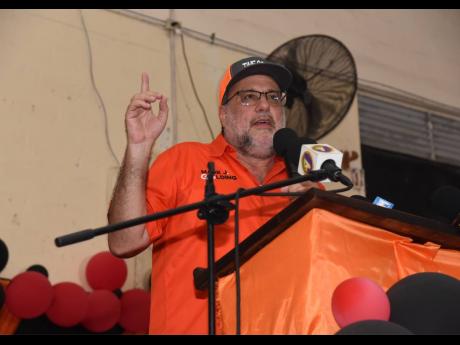Editorial | PNP, too, should say
Mark Golding is right about Prime Minister Andrew Holness’ duty to explain how his government will fund the planned increase of the income tax threshold, which he signalled last week while campaigning for the local government elections.
But that obligation rests no greater on the prime minister than on Mr Golding, if he wishes Jamaicans to take seriously the idea that his party is properly prepared to form the island’s next government, rather than intending to come to office merely because voters might be fed up with the current administration.
In other words, as this newspaper has said before, Mr Golding and his People’s National Party (PNP) must assure voters that they have workable policies. It is not sufficient for the PNP to offer vague concepts then say it can’t be expansive about its programmes too early for fear that they will be stolen by the government. Moreover, Mr Golding can’t forget that it was he who first placed the question of the income tax threshold back on the political agenda.
Income tax, of course, is one of those issues that animates voters. And both the prime minister and the Opposition leader are keenly aware of how the promise to increase the income tax threshold from $592,800 to $1.5 million changed its fortunes and helped to propel Mr Holness’ Jamaica Labour Party (JLP) to victory in the 2016 general election.
Municipal elections are to be held in 10 days. But they are being fought largely on national, rather than community issues. The PNP is seeking to make these polls a referendum on the government, hoping to gain momentum for the parliamentary elections in a year and a half.
OVERLY BUSY
Unsurprisingly, Mr Holness, as is the gift of governments, has been overly busy announcing new projects and commissioning others that were recently completed. Among his promises is “1.5 (2.0)”, a reference to his intention to add to his government’s increase of the income tax threshold nearly eight years.
The prime minister has not said what will be the new benchmark before Jamaicans are subject to tax on their incomes. However, several months ago, Nigel Clarke, the finance minister, suggested that the government wasn’t hostile to the $2.2 million proposed by the think tank, Caribbean Policy Research Institute (CAPRI),
Quite appropriately, Mr Golding wants details of what specifically the government plans to do and how it will affect the public finances.
“I say to the government, don’t just come with a gimmick because we are in a campaign,” he said. “If you are serious, tell us how you are going to pay for any increase on the 1.5.”
It is in everyone’s interest that this should happen, so as to avoid the shambolic approach to policymaking that attended the 2016 effort when JLP initially got its sums badly muddled.
Initially, in contradiction to most serious analysts, the party, then in Opposition, insisted that the giveback could cost around $8 billion and could be financed without new taxes, especially by using cash from a tax on petrol and ending an oil hedge, thereby saving the premium payments on that scheme.
UPENDED MACROECONOMIC STABILISATION
It turned out that the cost of the policy was over $30 billion, which, if implemented in one go, would have upended Jamaica’s macroeconomic stabilisation agreement with the International Monetary Fund. In the end, the increased threshold was implemented in two tranches months apart, which allowed the government to impose the additional taxes over two fiscal years.
Further, as originally planned, with anyone earning over $5 million receiving the original relief of $592,800, the programme would have generated significant anomalies, placing an unfair burden on large swathes of taxpayers. Forced to rejig its plans, the JLP in government applied the new threshold to all income levels, but imposed a 30, rather than 25 per cent rate on the chargeable income of anyone earning above $6 million.
This kind of messiness should be avoided, including by a party in opposition. That lesson ought to have been learned by Mr Golding.
Last May, he called for a 40-per cent hike in the threshold to compensate workers for the erosion caused by inflation. That would have pushed tax-free income to $2.1 million. By the time of his party’s annual conference in September, Mr Golding had increased his demand for a threshold of $3 million.
He has not said how the increased should, or could be, financed.
It wouldn’t be enough for the PNP to claim that it doesn’t have access to the income tax roll, the number of people in various salary bands, and therefore, how much money would be forfeited by any adjustment. That is the kind of information that a policy-oriented party should be able to get and analyse. Which is what voters expect from the alternative to the government.

